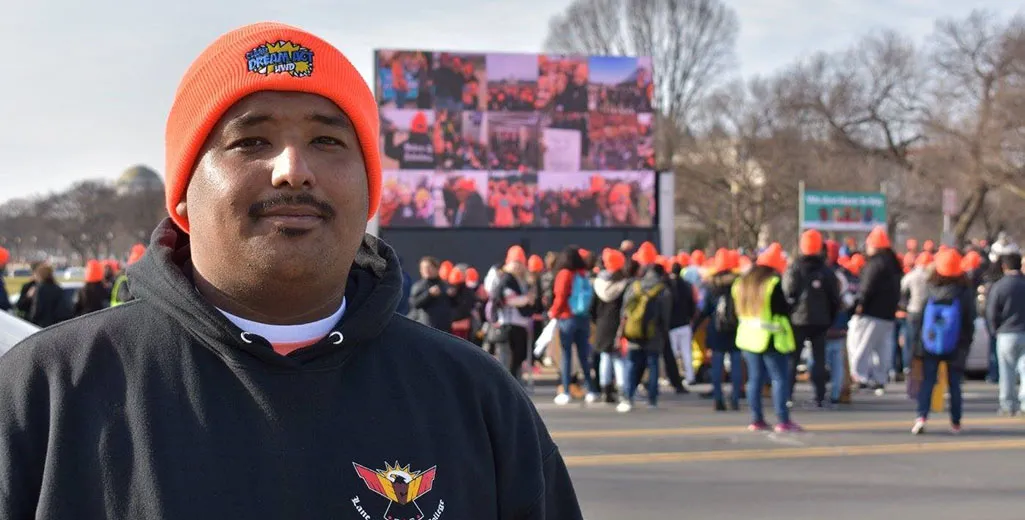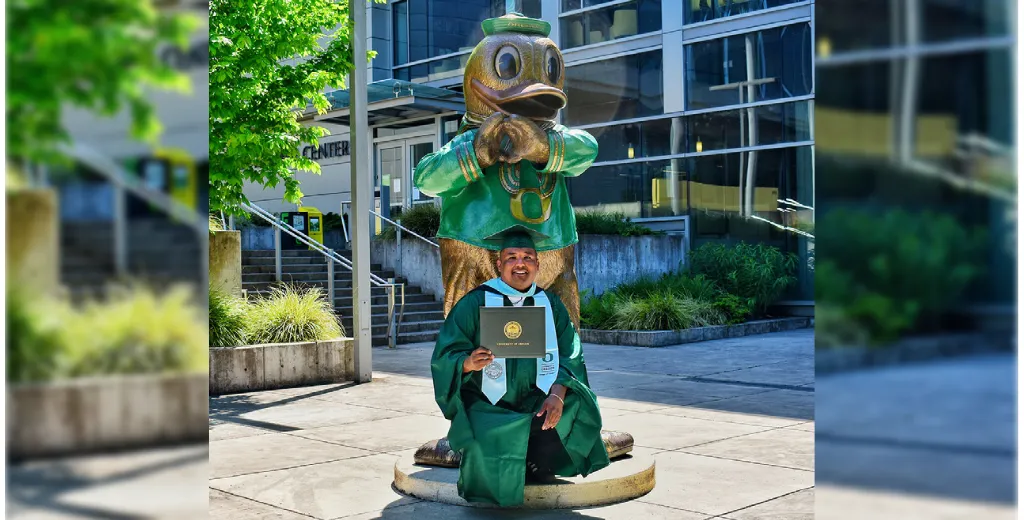The first time Jesus “Chuy” Narvaez spent the night in a US Immigration detention center, he was eight years old. He and his mother were detained after trying to cross the US-Mexico border.
They were released back to Mexico after a few days and tried two more times to get across. Once they made it into the US, they were reunited with his father who was waiting on them in California.
To this day, Narvaez remembers being detained with other women and children, his mother being dropped from the border wall by coyotes (guides who lead migrants across the border without documentation for a fee), hiding from immigration patrols, and even the graham crackers and apple juice snacks that the border police gave him.
Most of all, he remembers that from the moment he crossed as a child he was considered “undocumented.”
“I’ve known all my life that I was ‘undocumented,’” Narvaez says. “Growing up, it was scary because I was always hoping that my parents didn’t get picked up. One of my greatest fears was that I would come home, and my neighbors would say that my parents were gone.”
To avoid detection, he never called attention to himself and followed these rules: no crimes; no hanging out with bad kids, no getting into trouble, and follow the law.
“I always heard stories that undocumented kids couldn’t go to college and that there weren’t any resources out there, so in my mind, I was like, ‘Why care? Why even try to do good?’”
Narvaez says that prior to the Deferred Action for Childhood Arrivals (DACA), a federal immigration policy meant to protect unauthorized immigrants who were brought to the US as minors—known as “Dreamers”—from deportation, he never knew what his future would be. With so many uncertainties he didn’t see the benefits of school.
“I always heard stories that undocumented kids couldn’t go to college and that there weren’t any resources out there, so in my mind, I was like, ‘Why care? Why even try to do good?’” says Narvaez.
He arrived in Eugene his sophomore year and with his mother’s encouragement, he went to summer school every year at South Eugene High School so that he could graduate.
After barely graduating with a 1.7 GPA in 2010, Narvaez by his own admission was “done” with school. He enrolled at Lane Community College (LCC), but dropped out after one quarter.
He worked at different restaurant jobs and at a beef processing plant as a quality control quality assurance manager. He rose in the ranks and worked alongside the owner and with the US Department of Agriculture, making sure that beef didn’t leave the plant unless it was safe to do so.
Narvaez worked almost two years in the plant gaining experience, but he kept thinking about his parents and their journey to the US.
“They sacrificed everything for me to have a better life,” Narvaez says. “I kept thinking, ‘What am I doing in my life?’ I have a younger brother and sister. What kind of role model was I being by simply getting out of high school, working, and doing nothing more?”
This introspection was around the time that DACA was enacted in 2012. Since its creation nearly 826,000 people—including Narvaez—have been accepted into the program.
In 2013, another major shift happened. Narvaez remembers that was the year that two of his cousins were shot and killed in California.
“They were murdered by opposing gang members,” Narvaez recalls. “One of them was my age and wasn’t gang affiliated but my other older cousin was part of a gang. Those two cousins played in my mind, and I just kept thinking, ‘Man, they didn’t make it out. They didn’t get a second opportunity like me.’”
His priorities began to change, and he got more involved with Amigos Multicultural Services Center in Eugene, a program that he had participated in since his senior year in high school. As part of his work, Narvaez was a youth mentor and coordinator with Juventud FACETA, a youth group that helps Latino youth become community leaders.

He completed more than 375 community service hours and 125 training sessions with local youth teaching them about human rights and immigrant rights. He did presentations around Eugene and Springfield about what to do if stopped by the police, and as a youth mentor, he spoke to students about college.
Ironically, the more he taught, the more he learned about his own rights and the importance of an education.
While he was rethinking his future, his girlfriend—now fiancée—decided to set up a GoFundMe account to raise money for Narvaez to go back to college. He remembers that about $100 was raised, and even though the amount wasn’t enough to cover a college tuition, the people who gave were a huge encouragement for him.
In fact, someone from the community who knew of the youth work that Narvaez was doing saw the GoFundMe and messaged him about supporting his education.
“She asked me if I was serious about going back to college. I told her that I was very serious, but didn’t have the money.”
That extraordinary act of kindness enabled Narvaez to attend LCC in 2015.
The next thing Narvaez needed to consider was what he wanted to study in school. At first, he considered becoming an immigration lawyer. However, after taking several classes like anthropology, ethnic studies, and history, he knew that he needed to become a teacher to inspire a new generation of students about their own futures.
"I had to come to a point in my life where I could say that I'm proud to be undocumented," Narvaez says. "There are people out there putting their lives on the line and I felt the need to raise awareness about Dreamers. Today, when people ask me about my status, I will tell them without shame that I’m a DACA recipient.”
“I didn't even know there was a history of Latinos in the United States—it was never taught,” Narvaez says. “I wished I knew this information in high school, I wish these stories were told because that’s when I realized that I’m part of American history, and that knowledge empowered me.”
And in 2017 when President Trump announced that he was going to end DACA, Narvaez decided that he needed to do more. He traveled to DC to protest the decision as part of the nonprofit United We Dream with a group of almost 2,000 people from all over the country who were undocumented, DACA recipients, and allies.
"I had to come to a point in my life where I could say that I'm proud to be undocumented," Narvaez says. "There are people out there putting their lives on the line and I felt the need to raise awareness about Dreamers. Today, when people ask me about my status, I will tell them without shame that I’m a DACA recipient.”
With this confidence, he traveled again to DC as a guest of US Congressman Peter DeFazio, MA ’77, who invited Narvaez to President Trump’s State of the Union Address in 2018.
“Being there was powerful,” Narvaez recalls. “There was a small group of us from Oregon who were invited by elected officials. We were all community activists and just being there was an act of protest. We were saying, ‘We’re here and you’re not getting rid of us.’”
After years of commitment to the local community and his education, Narvaez graduated with honors and a 3.68 GPA from LCC in 2018.
With a new purpose in life, he knew that the UO was next. President Schill announced that the UO had signed amicus briefs supporting the continuation of DACA, so he knew that the university would be an encouraging environment. He decided to major in ethnic studies as well as pursue a master’s degree in education – but the looming question was how would he pay for college?
He applied to the UO’s Diversity Excellence Scholarship as well as the Ford Family Scholarship that had just opened up to DACA students. When he received word that he had gotten both, a tremendous burden was lifted.

“I started crying and I still get emotional because it was a big thing,” Narvaez recalls. “It meant that I didn’t have to worry about how I was going to pay for my books, food, or rent.”
Narvaez’s work at the UO was an extension of what he had already been doing. He continued to give presentations to high school students visiting campus, as well as to UO faculty, staff, and other students about his journey.
During his UO Teach practicum, he came across undocumented and DACA students who never knew their history. He made sure to introduce them not only to their history, but to other histories as well. He gave them resources for college and scholarships, and encouraged them to think big about their futureand to not be ashamed of their status.
This past spring, Narvaez became a “Double Duck,” a UO graduate with two degrees, and was immediately offered a position teaching social studies at North Eugene High School with the 4j School District.
Narvaez sees his role in the classroom more important now than ever before. A recent decision in July by the US District Court for the Southern District of Texas declared DACA illegal because its initial rollout in 2012 did not follow certain federal processes during its initial implementation.
The court vacated the original order that created DACA and banned the government from continued administration of the program for new applicants.
Narvaez says that this latest ruling is a major blow. For him, it underscores the reality that as DACA recipients and undocumented people nothing is guaranteed. The uncertainty will remain until laws are changed.
However, one thing is certain. Narvaez will never give up.
“We as an immigrant community are resilient,” Narvaez says. “We find ways to get things done. We find ways to overcome. We find ways to keep moving forward.”
- By Rayna Jackson, BA ’04 (Spanish),director of communications for the UO Alumni Association
Additional Articles
President reaffirms support for DACA recipients
President sets out university's position on DACA students
Patos


